Random Thoughts
by dave Landry
Doing your best going into a trade, and accepting the outcome is the secret to trading. The accepting part is the tough part, but it doesn't have to be. Let's explore how to
Improve Your Trading By Accepting These 10 Things
1. Sh*t Happens

Mark Douglas once said that all it takes is "one a-hole to screw up a perfectly good trade." A few years ago, I was speaking to a conference made up of predominantly daytraders. Through this, I learned that there is a common strategy among them to “short the parabolics.” This made me realize that the same exact trades that I’m long through patterns such as TKOs are the same exact markets that these traders are targeting. Knowing that all it takes is one a-hole to screw up a perfectly good trade prompted me to tell the audience that it "was nice to meet ya!"

Jodie Fisher-Source: IMBD
What’s interesting is that the “one a-hole” doesn’t necessarily have to be a trader. As I wrote in The Layman’s Guide To Trading Stocks (get the book here for free), many years ago I was feeling good about my profitable S&P futures position. Since everything was going swimmingly, I thought it would be a great time to grab a quick shower. After belting out a few verses of the "Big Dave is a financial genius" song, I peaked my head out to see that the S&P had turned from green to red. I was no only wet, but soaked! The (now former) emperor had no clothes. My profits were annihilated and I was now looking at a big loss. Was there a "fat finger" on Wall Street? Did some hedge fund blow up? Nope! Some idiot decided to start shooting people in our nation’s capital. Another example would be a CEO who decides to cook the books or thinks that it would be okay to sexually harass his secretary. The Jody Fisher debacle, which cost Hewlett-Packard shareholders billions, is "exhibit A" (or more accurately, exhibit "T, and A").
2. No one knows exactly what A market will do next


I know that I beat the dead horse here, but it’s worth reiterating. This is especially true with all the "get rich quick" gurus coming out of the woodwork daily. So, here it goes: No one knows exactly what a market will do-not you, not me, and certainly not the guy who screams on TV. Once you accept this your life becomes a lot easier. In fact, it’s actually quite liberating knowing that no one knows. As I often preach, this means that the little guy can compete with the big boys. In fact, there are times when we have an advantage. We can be quick and nimble where often they cannot. Case and point: I have a few pros (e.g., RIAs) on my trading service. When the occasional small cap stock or IPO takes off, I'll get a "That was cool, unfortunately, it was too thin for me to take for my clients" email.
3. Garbage In, Garbage Out

As I learned early in my computer science days, garbage in equals garbage out. A computer given crappy instructions will give you crappy output. Applied to trading, the better your stock picking, the better the chances of capturing a large gain. I know it’s cliché, but you need to focus on how to pick the best and leave the rest. There are two ways to improve here. First, practice deliberate practice (see "An Introduction To Deliberate Practice" in the Member's Area). Work hard at getting better. If you see a stock that took off then honestly ask yourself: could I? and should I have caught that move? Now, you have to phrase it within the context that-as the former CEO of HP has painfully learned-you can't kiss all the women.
4. good times follow bad and unfortunately vice versa

The one thing that pains me the most in my educational business is to watch someone struggle during choppy markets and then give up right before a big trend develops. For example, one client who was following along in my trading service gave up and then decided to check in a week or so later. When he saw the portfolio, he called me and said: “Dave, I feel like I broke up with my fiancé and the next Saturday night she won the Powerball.” True, the definition of insanity is doing the same thing over and over and expecting a different outcome. However, provided that you have a solid methodology, then the secret is to stick with it long enough to reap the fruits of your labor.

The flip side can be an even bigger problem. Wait Big Dave, so making a bunch of money is a problem? Yep, I’ve seen people do some crazy things like quit profitable businesses that took many years to build or tell the boss to F-off. They feel like they have discovered the holy grail, causing their ego to rear its ugly head. They over leverage, begin taking mediocre setups, fight the trend when it turns, and a host of other bad behaviors. Unfortunately, "pride goeth before the fall." Soon, they end up in ugly downward spirals. They fail to realize that their methodology and the market simply dovetailed. Said alternatively, they fail to realize that everything works better with trend. And, they forgot that discipline also played a huge role. Recognize when conditions are conducive for your methodology but then realize that it won’t always be this great.

A friend of mine, Joe Corona, used to travel the world in search of volatility. At one point he found himself in India. He actually sent me a picture of one of his traders kicked back at his desk reading "Dave Landry On Swing Trading." He titled the email "Indian Trend Following Moron." But I digress. Anyway, he told me “Dave, I like the new guys to have their ass handed to them right away. That way, and only that way, they learn to respect risk. The guys that are met with immediate success don’t know what hits them when the tide turns.”
Speaking of tides, "a rising tide lifts all boats" is one of the few true Wall Street adages. A rising tide also “lifts all egos”(Belsky).
5. there is a risk in every trade

Life itself is a risk. You probably would’ve been a lot safer today if you would have just stayed in bed. When you tell someone that there’s a risk of loss in a trade they look at you like you pooed your pants-sort of the same look that they give you if you walked into a Starbucks and said “I like a cup of coffee please” (try it and you'll see what I mean!). Yet, once in a trade they cuss and they fuss when the market goes against them. Paraphrasing Douglas, what happens is that they have not truly accepted the consequences of risk.

There are two consequences from risk. The first and most obvious is monetary. The second is the psychological impact that it will have on you. If you have not truly embraced and accepted your methodology and a solid money management plan, then the loss becomes much bigger than a loss in and of itself. The loss of the trade represents the ghost of losses past (read further). If you believe in your system and have thoroughly tested it through both good times and bad, then the loss needs to be a loss in and of itself. Yes, you might drop an F-bomb, but you reach a point where you quickly get over it and scream next!
6. there is no eternal sunshine-eventually, all trades End badly
All trades eventually end badly, even good ones. With my methodology you either get stopped out for a flat-out loss, capture a swing trade and then get stopped out for a small gain/scratch, or you capture both a swing trade and a longer-term move but ultimately give up a sizable portion of those profits.
Below are three examples. You will be shocked to see that I actually included a losing trade – probably the first “guru” in history to show a trade that didn't work!
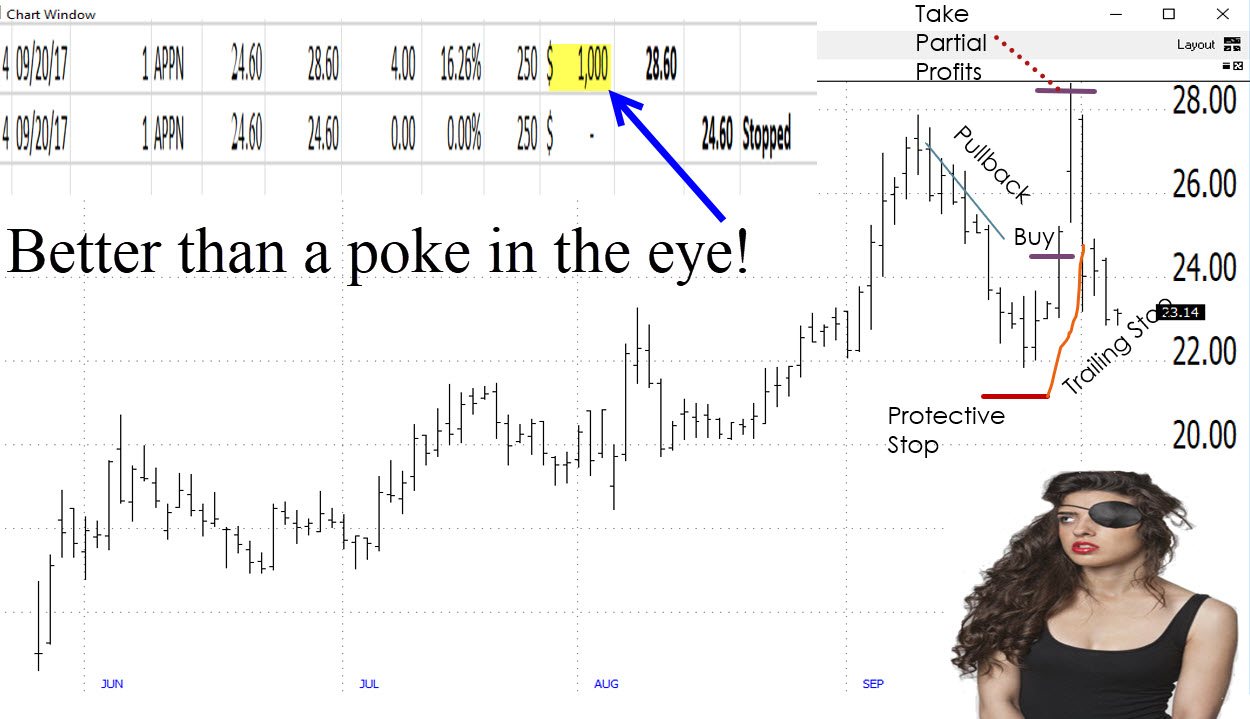
The "better-than-a-poke-in-the-eye" trade: You make a swing trade profit but then get stopped out.
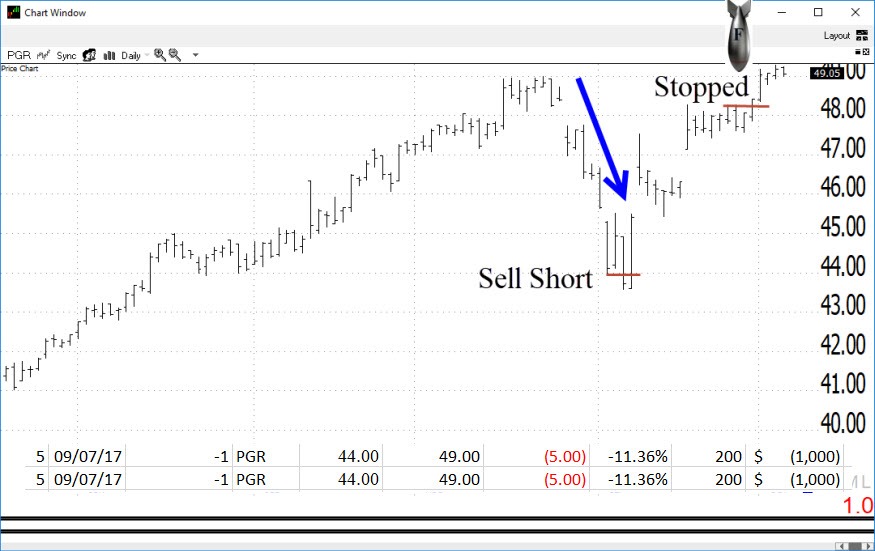
A trade that simply did not work. "It" (spelled with a silent SH) happens!
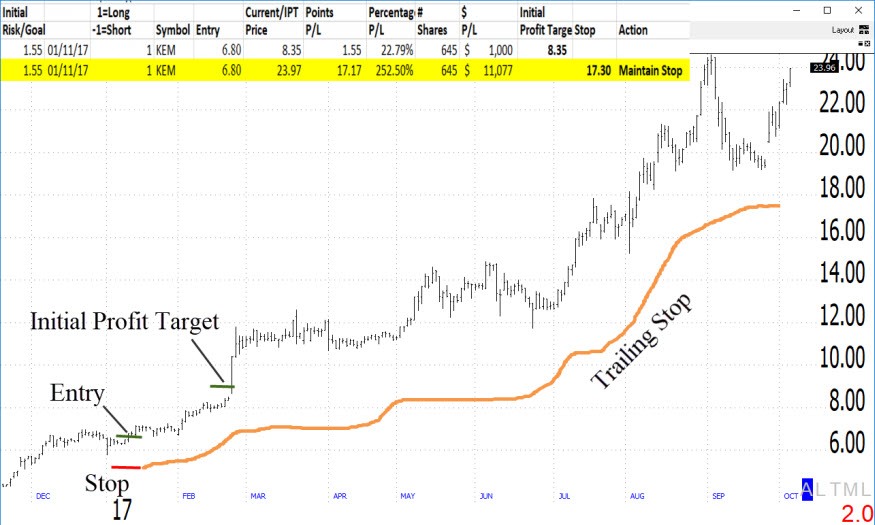
Here's a big winner. However, when, not if, the trailing stop is hit some profits will be given up-it will eventually "end badly."
7. more often than not markets will move against you
Greg Morris once said the market only makes new highs about 4% of the time. Even your best trades will spend a lot of time backing and filling. In other words, they will likely go against you most of the time. For instance, notice the big winner in our portfolio has spent most of its time giving up open profits (the red below) or at the least not accumulating them.
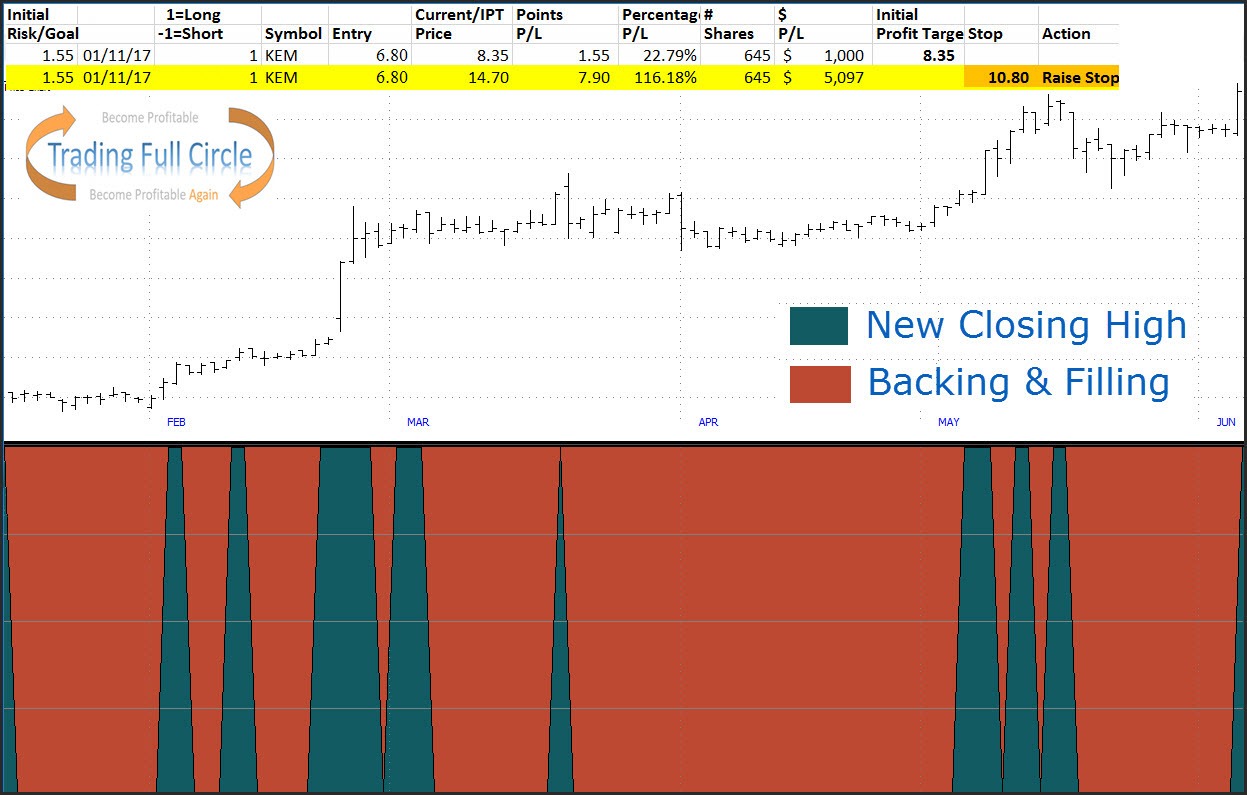
8. you’re going to be wrong a lot, but that’s okay

As I preach ad nauseam, the reason that engineers, automatic transmission mechanics, and doctors have so much difficulty trading is because they operate in a world where perfection is mandatory. If half their: bridges fell down, transmissions failed, or patients croaked respectively, they wouldn't be in business very long. Yet in trading, you could be wrong most of the time and still do quite well longer-term. In fact, with longer-term trend trading your only going to be right about 28% of the time (note: this is why I take a "hybrid" approach-trading for both short-term and longer-term gains in an attempt to beat those odds). Now I realize statistics a worthless and 70.6% of all people know that, but that 28% number is pretty accurate. I’ve seen this through years of testing, trading, and empirical research.

When I first got started in this business, I was obsessed with looking smart and being right. Now, I’d rather make money than be right. How do you think I got the name Trend Following Moron? Of course, I’d like every trade to be a winner. And, going into the trade, I truly believe that it will be-otherwise, why bother? However, I’d much rather have one or two big winners in the portfolio and a big bottom line then all winners and a small bottom line.

William Eckardt once said that The success rate of trades is the least important performance statistics and may even be inversely related to performance. The market lulls you into a false sense of security of high success rate techniques which often lose disastrously in the long run. The general idea is that what works most the time is nearly the opposite of what works in the long run.
High success rate methodologies such as naked option selling and pure reversion to the mean type trading can be a great way to have a brilliant but brief career on Wall Street. As I often say, "that'll work until it don't." The problem is, it can work for a long, long, time-lulling you into a false sense of security. Hey Big Dave, why do you preach against these methods so much? Well, I've been there, done that, and got the T-shirt. And, I'd hate to see you get hurt.
9. there will be emotions and consequences

As I preach, with every decision comes emotions. That’s physiology (Shull, Damiso). We simply physically cannot make decisions without emotions. And, with each unnecessary decision (e.g. micromanaging) comes more and more decisions. Considering this, you must reduce the amount of emotional roundtrips that you make by reducing the number of decisions in the first place. I truly believe that we are only made to make so many decisions in our lives. This is why the burnout rates are so high in careers such as air traffic controllers, inner city ER doctors,.......and daytraders.
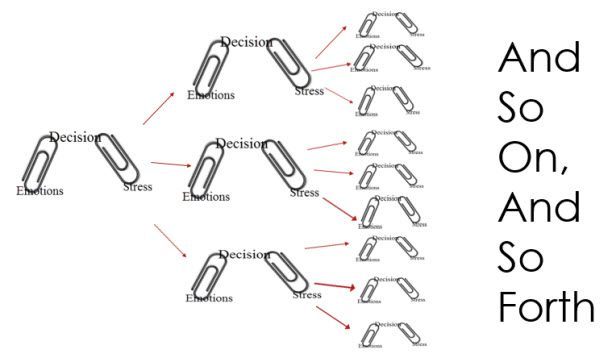

So how do you reduce the amount of decisions? First if you’re picking the best stocks to begin with then you will be trading less and less. The Pareto principle comes to mind. You know what setups-and in what overall conditions-tend to produce the best outcomes. The second way to reduce the number of decisions is to simply follow your plan. That's easier said than done but it doesn’t have to be. Something as simple as turning off your screens and using alerts/hard stops can help you to reduce the number of decisions that you’re making. Use physical restraints if necessary. Commit to commitment devices. As a somewhat drastic example, one client came to the realization that the Siren call of daytrading was detrimental to his account and had no business daytrading anyway. He solved this problem by moving his online account to a voice broker, forcing him to "call in" his trades. He now thinks twice before trading because he doesn't want to seem like a "lunatic" (his words).
10. fear is normal. becoming petrified is a sign that something is wrong

Bran: Can a man still be brave if he is afraid?
Father: You can only be brave when you are afraid.

Fear's one of those things that we can’t avoid. Fear actually keeps us alive. If you went through the day without any fear whatsoever more than likely you wouldn't make it to sundown. In trading you have to embrace and face your fears.
"He who forecasts all perils will never sail the sea"
Romanian Proverb
Going in, you need to ask yourself what’s the worst thing that can happen? Well, the worst thing is that the trade simply doesn’t work. And, provided that you have a solid money management plan and again not to beat a dead horse but truly picked the best going in then a loss is just that. "A" loss-a normal cost of doing business. The worst that you should fear.
Again, often though, a loss is much more than just "a loss." Douglas once pointed out that a loss is not necessarily a loss in and of itself, but rather all the losses of trades past combined. Ever lose your cool with a loved one over something small? Chances are, it's not the one thing that they did but all of the bad memories of that behavior combined. Case and point: My millennial daughter recently forgot to give the dogs (which she asked for in the first place!) water after constant reminders. My wife Marcy and I totally lost it. To an outsider, our reaction would seem maniacal at the least. And, the crime didn't justify the reaction and subsequent punishment (which BTW she was warned of ahead of time!).
Isabelle, if you're reading this. We still love you and believe that you are a great kid! BTW, have you checked the dogs' water lately?
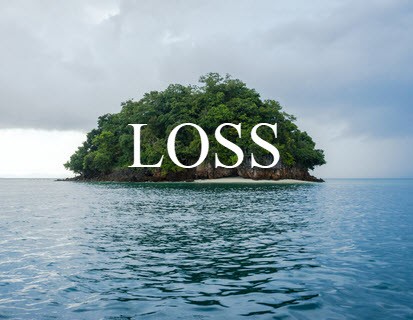
Getting back to trading, isolating the loss is key. If you picked the best and left the rest then so what! Again, sh*t happens! I know, guilty as charged! I still drop an F-bomb. However, there shouldn't be excessive fear in trading. I did a Week In Charts on this. Check it out but be careful not to operate heavy machinery afterwards!* In a nutshell, markets don't create fear, that's created internally. For instance, how stressful was the 2016/17 bear market in cocoa? Unless you're a contra-trend cocoa trader, there was no fear at all. You probably didn't even know that there was a cocoa bear market.

Douglas said it the best: "What you fear is not the markets but rather your inability to do what you need to do, when you need to do it without hesitation."
Volumes can be written on that quote. The bottom line is that if you have utmost confidence in what you're doing and recognize the difference between "intuition" and "into wishing" (Market Wizards) then you execute as planned. I never knew why it was so damn hard just to follow the plan until I recently discovered that different parts of the brain are used for planning and different parts of the brain are used for following that plan (Steenbarger). This was fodder for another Week In Charts:
In Summary
Trading, like life, all boils down to making decisions and living with them. Obviously, the living with them part is the tough part. The good news is that if you can accept the above 10 things then your trading should get a lot better.
May the trend be with you!

Dave Landry
*A line stolen from Greg Morris
After Thoughts

Mark Douglas Source: www.markdouglas.com
I found this column while working on the learning management system here at davelandry.com. In editing it, I couldn't help but notice the number of references to Douglas. Ironically, I recently received the following email:
"I was wondering what you think of Mark Douglas? Do you know who he is?"
Me: I think the world of him. I spoke with him once regarding a project (with a third party) but it never developed. Bummer! I quote him often in my presentations.
Read The Disciplined Trader:
https://www.davelandry.com/books-to-read/
Unfortunately, Mark's no longer with us. Although I only "met" him briefly, it doesn't take long to know that he truly was one of the good guys!


